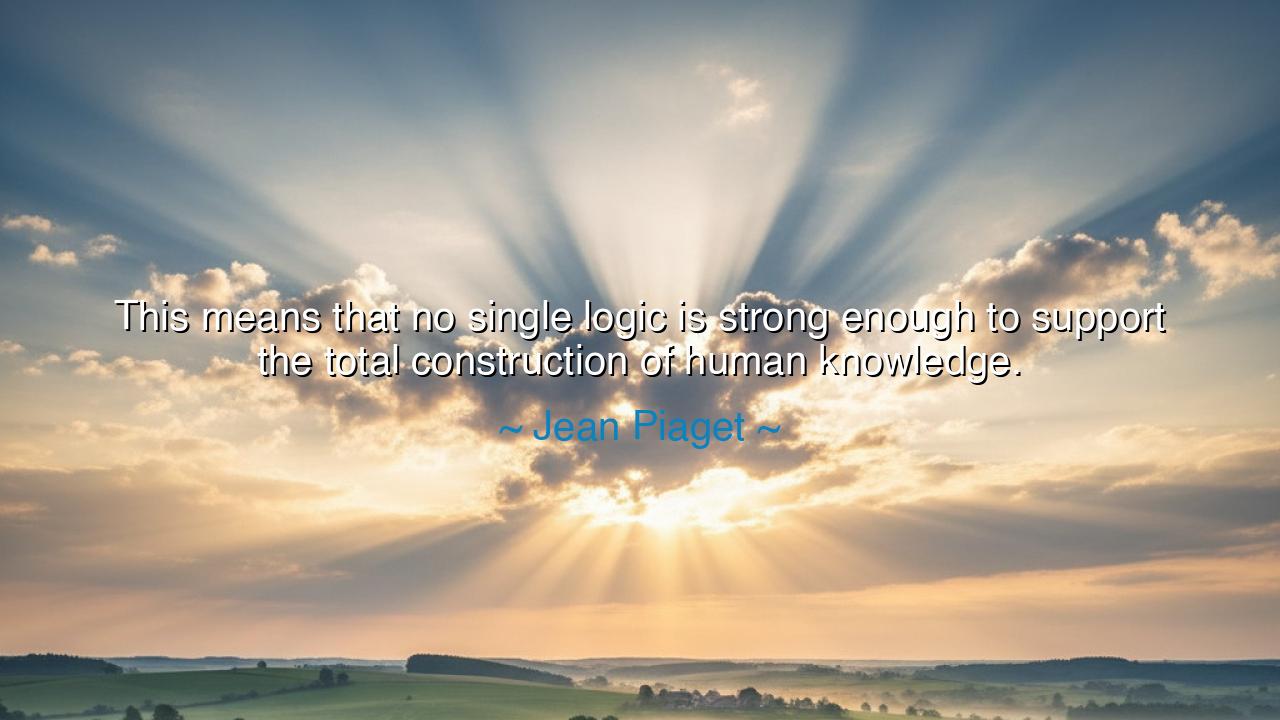
This means that no single logic is strong enough to support the
This means that no single logic is strong enough to support the total construction of human knowledge.






“This means that no single logic is strong enough to support the total construction of human knowledge.”
Thus spoke Jean Piaget, the great explorer of the human mind — a man who gazed not into the heavens, but into the soul of learning itself. In these words, Piaget unveils a truth that humbles both the philosopher and the scientist: that no single system of thought, no solitary method or formula, can contain the vast and evolving mystery of human understanding. For the mind of man, like the universe it studies, is boundless — and every attempt to confine it to one framework, one logic, one vision, is like trying to hold the wind in one’s hands.
Piaget, in his study of the development of knowledge, saw that thought itself grows like a living tree. It begins in simplicity — the child’s early reasoning, the scientist’s first principles — and branches outward in endless directions. Each branch has its own logic, its own coherence, yet no branch alone can represent the whole tree. So too with human knowledge: reason alone is not enough, nor emotion, nor intuition, nor faith. Each illuminates a fragment of the truth, but the fullness of understanding lies in their integration, not their isolation. Thus, Piaget’s words are not a denial of logic, but a call to intellectual humility — a reminder that wisdom demands not certainty, but openness.
The origin of this saying lies in Piaget’s lifelong quest to unite psychology, philosophy, and biology — to understand how knowledge grows, not merely what it is. He observed that the human mind constructs understanding through interaction, adaptation, and change. Knowledge is not built upon a single foundation of logic, but upon a living dialogue between many modes of thought. The mathematician, the poet, the mystic, and the child — each apprehends reality through different patterns of reasoning. To believe that one logic can rule all is to mistake the part for the whole, the instrument for the orchestra.
This truth is seen clearly in the story of Albert Einstein, who, though a man of science, once said, “Imagination is more important than knowledge.” For even he, master of equations and reason, knew that logic alone could not birth the theory of relativity. It was born instead from a marriage of logic and vision — from the creative leap that transcends ordinary reasoning. The laws of physics could not have been revealed by deduction alone; they required that spark of insight, that freedom to think beyond the boundaries of formal logic. Thus, Einstein’s triumph embodies Piaget’s wisdom: that the great advances of humanity come not from one mode of thought, but from their union.
In this way, Piaget’s words carry both warning and promise. The warning is this: that dogma of any kind — scientific, religious, or philosophical — becomes a prison when it claims total truth. The promise, however, is radiant: that by embracing the diversity of ways in which humans know — reason and feeling, analysis and art, faith and experiment — we draw closer to the infinite richness of reality. To learn deeply, one must not be rigid but supple; not fixed, but flowing. The wise mind is like water — it takes the shape of every vessel, yet belongs to none.
This insight also speaks to the life of nations and communities. When societies cling to one way of thinking — to one “logic” of governance, or economy, or belief — they stagnate. But when they listen to the voices of many — the scientist and the farmer, the poet and the engineer — then knowledge becomes collective, creative, and enduring. The strength of humanity lies not in uniformity, but in synthesis, in the meeting of minds and methods. Each discipline, each tradition, offers a shard of the greater mirror that reflects truth. Only together can they form the whole.
Therefore, O seeker of wisdom, remember Piaget’s teaching: never worship one logic as supreme. Cherish instead the harmony of many — the logic of reason, the intuition of the heart, the rhythm of art, the faith that transcends understanding. For every great discovery is born from their union, and every enduring truth is shaped by dialogue, not domination. Let your mind be vast as the sky, able to contain contradiction, to hold paradox, to find unity amid diversity.
In the end, Piaget’s words are both a map and a mercy: a map for those who would walk the endless path of knowledge, and a mercy for those who fear they cannot know all things. For he reminds us that the beauty of human understanding lies not in its completeness, but in its continual growth. We need not find the final logic, for there is none; instead, we must learn to weave all our ways of knowing into a greater harmony — a tapestry of truth as living, complex, and infinite as the human spirit itself.






AAdministratorAdministrator
Welcome, honored guests. Please leave a comment, we will respond soon